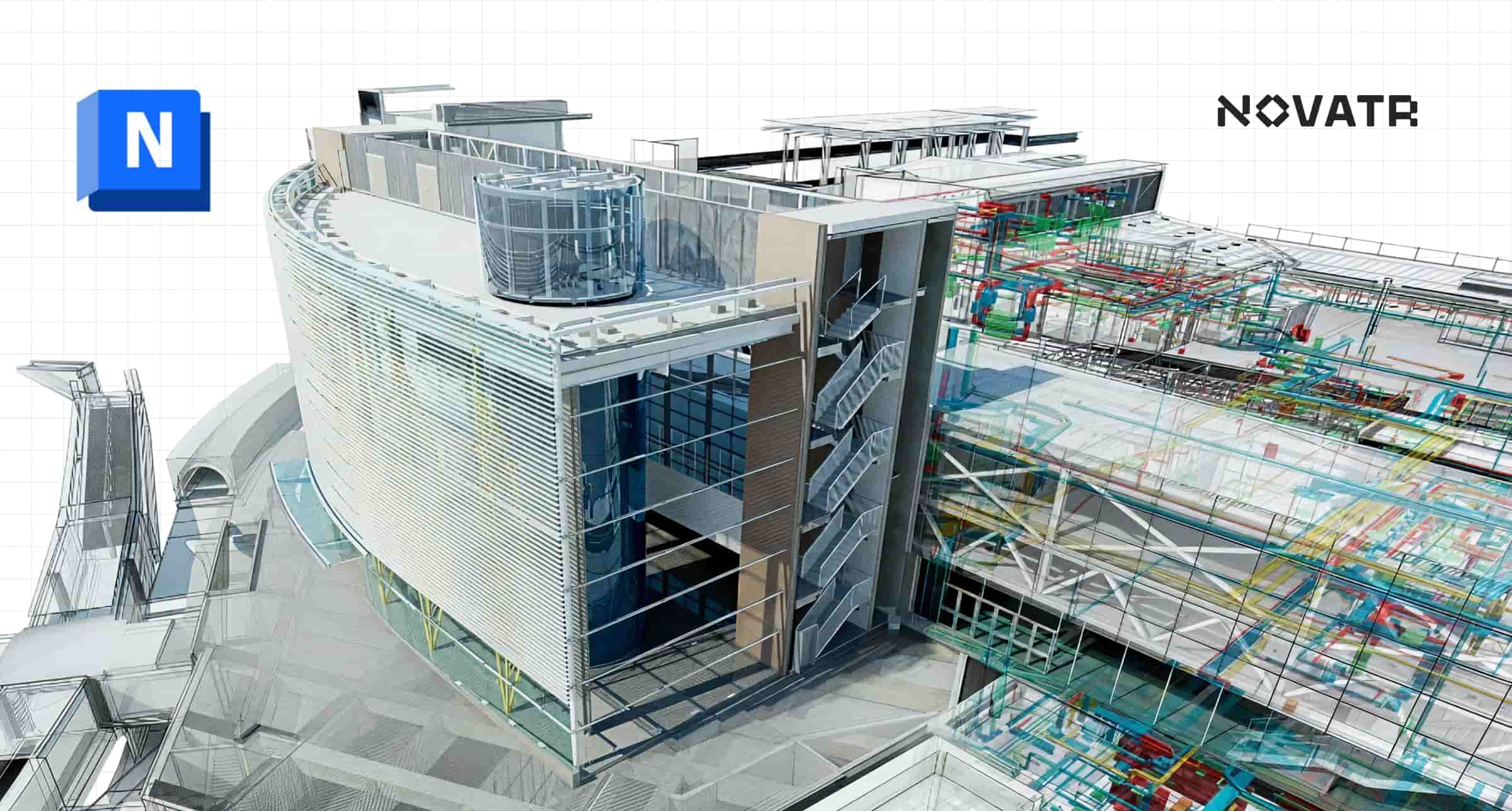
As the AEC industry fully embraces Building Information Modeling (BIM) for better project coordination and execution, the demand for software like Navisworks, Revit, SketchUp and ArchiCAD continues to soar. Proficiency in Navisworks, a powerful software for project review, clash detection, and 3D visualization, sets you apart from your peers. It demonstrates your ability to manage complex projects, streamline workflows, and enhance collaboration across multidisciplinary teams. With its strong focus on project coordination, construction simulation, and model integration, Navisworks skills are highly valued by employers. According to Anita BIM Solutions, Navisworks 2026 now supports IFC v4.3, providing faster load times and enhanced geometric fidelity, which is crucial for architects working with diverse BIM models.
In this article, we will explain how learning Navisworks can boost your career and cover the top 10 best online Navisworks certifictaion courses in the USA.
How Can Learning Navisworks Make You Stand Out From the Crowd?

Navisworks is a modern software that simplifies the process of design. It brings perspective to unconventional and complex projects, allowing architects to visualize what’s genuinely possible. Using Navisworks, you can identify hurdles and work towards resolving them. Take a look at the reasons that make Navisworks and BIM training count.
1. Clash Detection and Resolution
Autodesk Navisworks allows professionals to identify and highlight clashes between building elements, such as structural components, mechanical systems, and electrical conduits. By detecting these conflicts early, architects can address them before construction starts, saving time, reducing costs, and minimizing the need for rework.
2. High-Quality Visualization
The software offers powerful design visualization tools, enabling architects to create detailed 3D models of their projects. These models provide an immersive view, helping stakeholders better understand the project’s scope, aesthetics, and functionality. High-quality visualizations also improve client presentations, making it easier to convey design intent and gain project approvals.
3. Accurate Project Estimation
Autodesk Navisworks’ ability to generate accurate Bills of Quantities (BOQs) and cost estimates takes up the burden of manual calculations. This allows architects to create precise budgets and prevent cost overruns. It also supports the evaluation of different design options based on their cost impact.
4. Improved Collaboration
Navisworks allows for seamless integration of data from various design tools and formats. Since architects and civil engineers use different software for modeling, analysis, and documentation, Navisworks enables them to consolidate all that data into one interface. This integration enhances coordination and collaboration among project stakeholders, reducing misunderstandings and ensuring everyone stays aligned throughout the project.
5. 4D Simulation
It supports 4D simulations, adding time as the fourth dimension to the 3D model. This feature enables professionals to create construction schedules and visualize the sequence of activities over time. By simulating the construction process, project teams can spot potential scheduling conflicts, optimize workflows, and ensure projects are completed on time.
6. Optimized Collaboration
Using Navisworks provides a variety of tools for generating reports, creating markups, and sharing project information with stakeholders. These features ensure that all participants have access to up-to-date data and can offer feedback in an organized way. Improved communication minimizes errors and helps achieve project goals efficiently.
7. Improved Risk Management
Navisworks helps identify and manage project risks with its detailed analysis tools. By visualizing the entire project and understanding how various elements are interconnected, architects can anticipate potential risks and create effective strategies to address them.
Also Read: Top 10 BIM Online Certification Courses in the USA for Architects & Civil Engineers
Top 10 Navisworks Training Courses:A Comparative Guide
It is crucial to consider factors like duration, faculty expertise, fee and certification when choosing a Navisworks and BIM course online. Here’s a comparative analysis to help you make that choice.
|
Course Name |
Duration |
Fee |
Certification |
|
BIM and Revit Professional Course for Architects by Novatr |
7 months |
$3500 |
Yes |
|
Navisworks Online Training by Multisoft Virtual Academy |
NA |
NA |
NA |
|
Navisworks Manage - Beginners to Advanced by BIM learn |
NA |
NA |
NA |
|
Navisworks Online Course for Beginners by Archadmeia |
NA |
NA |
NA |
|
Navisworks Beginner by Academy Class |
NA |
NA |
NA |
|
Navisworks Manage by Microsol Resources |
NA |
NA |
NA |
|
Audoesk Navisworks by IMAGINiT Technologies |
NA |
NA |
NA |
|
Navisworks Manage Essentials by KETIV Technologies |
NA |
NA |
NA |
|
Navisworks Training - Navigation(Absolute Beginner) by Cory McDermott |
NA |
NA |
NA |
Why Should You Choose Novatr?
Novatr’s online BIM certification course aims to help architects, particularly in the USA launch a successful BIM career, regardless of their experience level or technical expertise. Through hands-on projects, mentorship from industry experts, and access to advanced techniques and software, this all-inclusive course empowers architects to master Navisworks with 10+ BIM software and land lucrative career opportunities.
Curriculum deatils:
- Introduction to BIM
- Basics of BIM
- Advanced BIM Modeling
- Information Management
- 3D Visualization
- BIM Process and Industry Workflows
- Team Collaboration
- BIM Coordination using Navisworks
- Dynamo, Sustainability tools and Primavera
Significant aspects of the program:
- Career-focused guidance with personalized feedback from industry recruiters.
- Curriculum endorsed by over 200 industry professionals and aligned with ISO 19650 standards.
- Affordable pricing with flexible payment options, including up to 24-month instalments for U.S. learners.
Opportunity to learn from top industry experts from renowned firms like AECOM, Populous, Henning Larsen, and ZAHA. - 80+ hours of detailed sessions complemented by 24/7 AI-powered query support.
- Certification recognized across the industry, enhancing career advancement in BIM.
Engaging, gamified learning experience through our AI-powered Learning Management System.
The flexible curriculum includes weekly live sessions, mentor interactions, and a live capstone project. Students learn alongside an international community of architects. Upon course completion, students will receive a globally recognized BIM certification, a professional-level portfolio, and access to new job opportunities. With the rising demand for Autodesk Navisworks in the USA, architects can leverage this course to work on global projects. Join a global network of 6,000+ learners. Enroll now for the 2026 cohort!
Conclusion
Reputed industry leaders in the USA highly value architects with expertise in Navisworks. Proficiency in this powerful tool offers higher salaries, accelerated career growth, job security, and an enhanced work-life balance. Navisworks allows professionals to navigate seamlessly across various disciplines and gives them control over projects. Embracing these advanced tools can open new opportunities and position you as a future-ready professional.
As the architecture and construction industry continue to embrace BIM and integrated project management, the demand for Navisworks professionals is set to rise. With the right training and skills, architects can secure prestigious roles, keep up with industry trends and contributing to efficient project outcomes. Taking up a Navisworks training course can be a rewarding experience for your career. However, before selecting a course, evaluate the curriculum, mentors, capstone projects, and placement opportunities.
Join the BIM Professional Course for Architects by Novatr and explore this course designed by industry veterans.
Head to our Resources Page to get more insights on the importance of BIM and why you need to learn it.
Frequently Asked Questions
1. Why is Navisworks important for architects?
Ans: Navisworks is essential for architects because it allows them to create detailed 3D models of building designs, enabling better visualization and coordination of complex projects. The software integrates data from various design tools and disciplines, ensuring that architects can view the entire project and identify potential issues early in the design process. Navisworks also facilitates collaboration among teams, offering features like clash detection, 4D simulations, and real-time project coordination, making it essential for architects who want to streamline workflows, reduce errors, and ensure efficient project delivery.
2. How does learning Navisworks enhance job opportunities in architecture?
Ans: Learning Navisworks enhances job opportunities in architecture by equipping professionals with the skills needed to work with BIM technology. Expertise in Navisworks allows architects to manage complex projects more effectively, collaborate with stakeholders, and optimize workflows. Since many architectural firms rely on Navisworks for project management, clash detection, and design visualization, proficiency in this software significantly improves your employability and can open doors to more advanced roles, offering career growth and competitive pay.
3. What career roles require Navisworks expertise?
Ans: Navisworks expertise is required in various career roles within the AEC industry. These roles include architects, civil engineers, MEP engineers, project managers, BIM coordinators and BIM managers.
4. What are the three types of Navisworks?
Ans: Navisworks is available in three main versions, each designed for different levels of use and industry needs:
- Navisworks Manage – The most comprehensive version, including advanced features like clash detection, project simulation, and comprehensive 4D and 5D BIM capabilities.
- Navisworks Simulate – Offers most of the features in Navisworks Manage, excluding clash detection and a few advanced tools. It is ideal for those who need 3D model viewing and project coordination without advanced BIM functionalities.
- Navisworks Freedom – A free viewer that allows users to view and navigate 3D models created in other Navisworks versions. It’s typically used for sharing project files and visualizing models but doesn’t include editing or advanced analysis features.
5. Which industries use Navisworks, and how is it applied in real projects?
Ans: Navisworks is widely used across several industries, including:
- Architecture – Architects use Navisworks for visualizing building designs, performing clash detection, and generating accurate project schedules. It helps ensure that all design elements align with client specifications and that projects run smoothly.
- Construction – Construction companies use Navisworks for project coordination, 3D modeling, and simulation of construction processes. This ensures accurate planning and reduces the risk of errors on-site.
- Engineering – Structural, mechanical, and electrical engineers rely on Navisworks for integrating their designs with the overall building model, detecting clashes, and optimizing system coordination.
- Real Estate Development – Developers use Navisworks for 3D visualization and to understand the scope, timelines, and costs of projects. This helps in client presentations and decision-making processes.
- Urban Planning and Infrastructure – Navisworks is used for designing large-scale infrastructure projects like roads, bridges, and public spaces. The software helps in visualizing complex environments and ensures all aspects of the project are considered from the planning phase.
6. How long does it take to complete a Navisworks course?
Ans: The duration of a Navisworks course can vary depending on the depth of the content. Basic courses typically take between 10-20 hours to complete, while advanced courses may take 30-50 hours. Many courses are self-paced, allowing students to learn at their convenience. Some intensive programs or workshops may be completed in 2-5 days.
Was this content helpful to you



.jpg)




.jpg)
.png)

